Cremation, Caste, and Cosmogony in Karmic Traditions.
Cremation, Caste, and Cosmogony in Karmic Traditions.
Cremation, Caste, and Cosmogony in Karmic Traditions.
Create successful ePaper yourself
Turn your PDF publications into a flip-book with our unique Google optimized e-Paper software.
improper performances of funerals. A proper funeral<br />
conducted by the sons may give a positive feedback on<br />
the deceased’s karmic record. If the flesh is properly<br />
prepared <strong>and</strong> provided to the gods, then they are satisfied<br />
<strong>and</strong> credit the deceased. If, on the other h<strong>and</strong>, the sons<br />
are sloppy the gods punish the deceased doubly, <strong>and</strong> the<br />
sons will suffer when their time comes. Those who have<br />
died a bad death by suicide, drown<strong>in</strong>g, cholera, attacked<br />
by a tiger <strong>and</strong> so on, are not given a cremation, <strong>and</strong><br />
hence they will atta<strong>in</strong> a lower <strong>in</strong>carnation per def<strong>in</strong>ition<br />
s<strong>in</strong>ce their flesh does not become a part of the<br />
hydrological circle. Most likely, if we believe the vivid<br />
descriptions of the various hells, these are s<strong>in</strong>ners whose<br />
souls leave the anus dur<strong>in</strong>g the funeral <strong>and</strong> hence<br />
become immensly filthy <strong>and</strong> impure, <strong>and</strong> there is no<br />
wonder they are born <strong>in</strong>to unfortunate creatures <strong>and</strong><br />
malignant spirits. Thus, it seems that if the gods cannot<br />
use the flesh of the body as life-giv<strong>in</strong>g water, then the<br />
deceased will become <strong>in</strong>carnated, when reborn on earth,<br />
<strong>in</strong> parts of the impure materiality he presented to the<br />
gods dur<strong>in</strong>g his funeral. Consequently, if one has an<br />
embodiment prior to the next <strong>in</strong>carnation, then this<br />
negative bio-moral substance will accelerate the spiral<br />
downwards.<br />
If I am at least partly correct <strong>in</strong> emphasis<strong>in</strong>g the<br />
importance of the flesh <strong>in</strong> funerals, then one may rightly<br />
ask what it is with the human flesh that makes it so<br />
highly auspicious <strong>and</strong> valuable for the gods? From the<br />
div<strong>in</strong>e perspective, the human flesh or this particular<br />
constellation of the elements is the most precious one<br />
can give to a soul, which has not yet become a god or<br />
semi-god. Aga<strong>in</strong>, matter encapsulates the thought: it is a<br />
prison. The human body is the most fortunate prison<br />
possible to obta<strong>in</strong> on earth, <strong>and</strong> this embodiment puts the<br />
least restrictions upon the spiritual enlightenment. In<br />
fact, the human body is only a prison locked from the<br />
<strong>in</strong>side, not the outside, <strong>and</strong> the devotee may enable a<br />
total liberation through penance <strong>and</strong> prayer. This is the<br />
reason why the human flesh is so highly precious<br />
compared to other constellations of the elements, for<br />
<strong>in</strong>stance the flesh of a rat. The human flesh is a spiritual<br />
substance, <strong>and</strong> by desecrat<strong>in</strong>g the human body with<br />
impurity the devotee offends the gods. Return<strong>in</strong>g to the<br />
life-giv<strong>in</strong>g waters <strong>in</strong> relation to death, this perspective<br />
makes sense. Death rituals are only performed for<br />
humans <strong>and</strong> no other creatures. Thus, if one does not<br />
return the body to the gods <strong>in</strong> a pure condition, one has<br />
wasted the most precious matter on earth, an act one<br />
then would be punished for. If one is born <strong>in</strong>to a human<br />
body on earth, this necessitates that the soul re<strong>in</strong>carnates<br />
without any materiality l<strong>in</strong>ger<strong>in</strong>g to it so it can re-enter<br />
the hydrological <strong>and</strong> agricultural cycle.<br />
If we agree on the premises from an academic po<strong>in</strong>t of<br />
view but not accept<strong>in</strong>g that this was what happened with<br />
Roop Kanvar, then there seems to be a coherency<br />
between quality of the flesh/spiritual capacity <strong>and</strong> the<br />
potential for common welfare for society. The lifegiv<strong>in</strong>g<br />
ra<strong>in</strong>s are on a general level the most prosperous<br />
288<br />
gift that a body can become. On a div<strong>in</strong>e scale, however,<br />
there are even more precious outcomes. Holy men <strong>and</strong><br />
sadhus <strong>in</strong> general conduct their own death rituals when<br />
they are alive, <strong>and</strong> hence, they are not cremated <strong>and</strong><br />
there is no mourn<strong>in</strong>g period, <strong>and</strong> they atta<strong>in</strong> heaven. The<br />
funeral of Milarepa, the renowned Buddhist yogi, was<br />
particular spectacular. The funeral pyre was transformed<br />
<strong>in</strong>to a celestial mansion,<br />
“The flame at the base took the form of an eightpetaled<br />
lotus blossom, <strong>and</strong> the curl<strong>in</strong>g tips of the fire<br />
unfolded <strong>in</strong>to the eight auspicious emblems <strong>and</strong> the<br />
seven royal <strong>in</strong>signia. Even the sparks took the form of<br />
goddesses bear<strong>in</strong>g many offer<strong>in</strong>gs. The chants of<br />
worship <strong>and</strong> the crackl<strong>in</strong>g of the dazzl<strong>in</strong>g fire sounded<br />
like the melodious tones of various musical<br />
<strong>in</strong>struments, such as viol<strong>in</strong>s, flutes, <strong>and</strong> tambour<strong>in</strong>es.<br />
The smoke permeated everyth<strong>in</strong>g with the fragrance<br />
of perfume <strong>and</strong>, <strong>in</strong> the sky above the funeral pyre,<br />
young gods <strong>and</strong> goddesses poured a stream of nectar<br />
from the vases they held, <strong>and</strong> offered abundant<br />
delights for the five senses” (Lhalungpa 1979:182-183).<br />
The cremation was completely transparent. Some saw<br />
the relics of the corpse as a huge stupa of light st<strong>and</strong><strong>in</strong>g<br />
<strong>in</strong> the cremation cell, some saw sacred implements,<br />
golden rays, offer<strong>in</strong>gs beyond imag<strong>in</strong>ation, yet others<br />
saw the expanse of empty space. The dak<strong>in</strong>is carried<br />
away all the sacred relics, <strong>in</strong>clud<strong>in</strong>g the ashes, leav<strong>in</strong>g<br />
noth<strong>in</strong>g to the humans because the spiritual awaken<strong>in</strong>g is<br />
the most important of all relics (ibid:184). Spiritual<br />
awaken<strong>in</strong>g <strong>and</strong> fragrance, perfume <strong>and</strong> nectar poured by<br />
gods <strong>and</strong> goddesses – this is heaven – <strong>in</strong> the normal<br />
world the life-giv<strong>in</strong>g waters are the most precious a<br />
human body can be transformed <strong>in</strong>to.<br />
There is a structural homology <strong>in</strong> the way the bodies of<br />
Milarepa, Roop Kanvar <strong>and</strong> K<strong>in</strong>g Birendra were<br />
redistributed back <strong>in</strong>to society. Their bodies embraced<br />
everyth<strong>in</strong>g like a lotus but <strong>in</strong> different ways. Milarepa<br />
gave a glimpse of heaven. Roop Kanvar provided water<br />
<strong>and</strong> life for society, <strong>and</strong> as I <strong>in</strong>terpreted the katto-ritual,<br />
the k<strong>in</strong>g’s body was divided <strong>in</strong>to the caste structure <strong>and</strong><br />
gave legitimacy to the social structure. The k<strong>in</strong>g has a<br />
special role <strong>in</strong> society, as it is expressed <strong>in</strong> a Muslim<br />
poem; “The world is a garden, whose gardener is the<br />
state; The state is the sultan whose guardian is the Law”<br />
(Eaton 1993:29). The k<strong>in</strong>g’s body creates <strong>and</strong> legitimises<br />
the social structure <strong>and</strong> laws <strong>in</strong> society whereas all<br />
others make it prosperous: that is through the life-giv<strong>in</strong>g<br />
waters. Thus, the body of different persons fulfil various<br />
roles accord<strong>in</strong>g to their dharma. The preparation of the<br />
flesh of the body is the essence of the funeral rite<br />
because of the dual function of death; the <strong>in</strong>dividual’s<br />
dest<strong>in</strong>y <strong>and</strong> the future of society. It <strong>in</strong>volves soteriology<br />
at two levels. Without ethicisation of death <strong>and</strong> the flesh<br />
for further life, the process of ethicisation step 1 would<br />
not have turned <strong>in</strong>to ethicisation step 2. A karma<br />
ideology necessitates more than just <strong>in</strong>dividual<br />
punishments <strong>and</strong> rewards s<strong>in</strong>ce humans are m<strong>in</strong>iature<br />
replicas of the gods. Therefore, the div<strong>in</strong>e will <strong>and</strong><br />
cosmic battles <strong>in</strong> Kali-yuga have to be <strong>in</strong>corporated <strong>in</strong>to


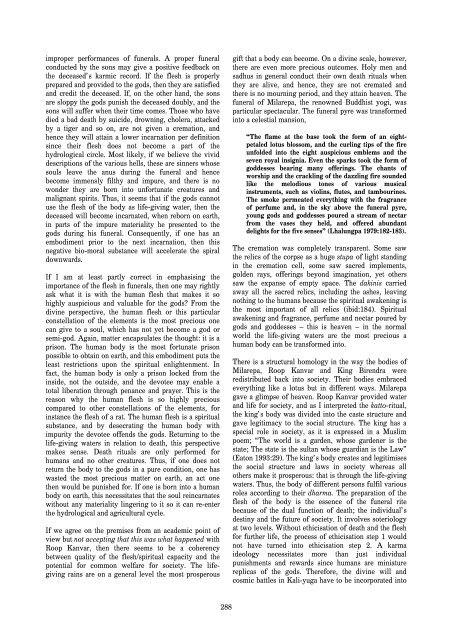
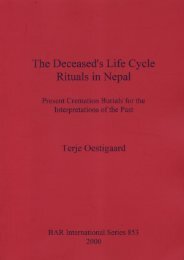


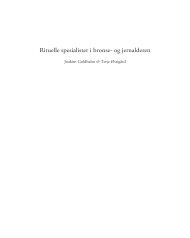
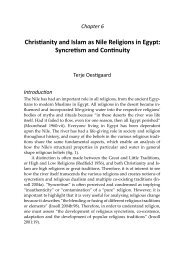
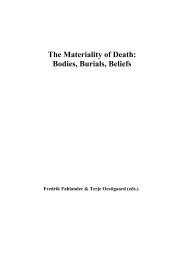


![Fullmono-AK [P2118].indd - oestigaard](https://img.yumpu.com/18994998/1/177x260/fullmono-ak-p2118indd-oestigaard.jpg?quality=85)